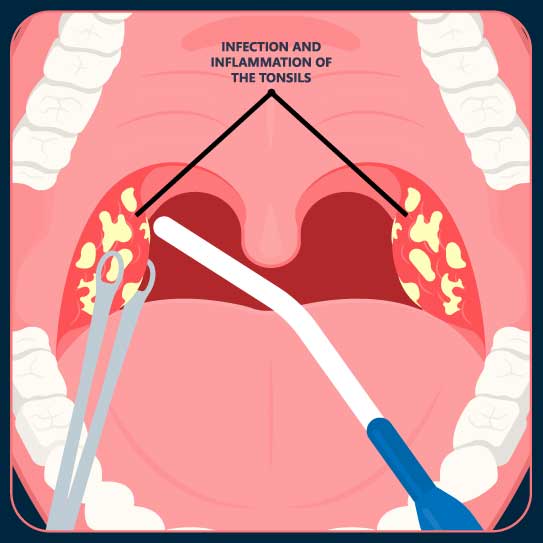
Bangalore
USFDA-Approved Procedure
Support in Insurance Claim
No-Cost EMI
Same-day discharge


Tonsillectomy Treatment - Diagnosis and Procedure
Diagnostic tests required for tonsillectomy surgery in Bangalore
If you have symptoms of tonsilitis, your doctor may perform the following diagnostic tests before finalizing your treatment plan.
The physical examination includes checking the inside and outside of the throat for any abnormal swelling or rashes, palpating the neck to evaluate swelling in the neck lymph nodes, and assessing their breath sounds to check for pulmonary infection.
Pristyn Care provides a free consultation with the best ENT specialists for the diagnosis and treatment of tonsillectomy in Bangalore.
Treatment for tonsillitis
Different surgical procedures for tonsillitis or tonsil stone treatment are:
It is a laser procedure in which the tonsils are removed using a focused, high-energy radiofrequency beam. It is also known as radiofrequency tonsil ablation.
A harmonic scalpel cuts the inflamed tonsils through vibration energy. It generates heat and friction, leading to protein denaturation and dissection of the tonsils.
In this procedure, the surgeon uses low-energy electrocautery to remove the inflamed tonsils. It is one of the oldest or most conventional methods for tonsil removal.
A cold knife dissection is traditional open surgery for tonsil removal. The surgeon uses a ‘cold’ or sharp knife to cut the tonsils and their capsules from the surrounding tissues.
Best ENT Clinics For Tonsillectomy
At Pristyn Care, you can avail advanced coblation surgery for tonsil removal surgery for better results and quicker recovery as it avoids damaging throat structures other than tonsils.
At Pristyn Care, we have ENT surgeons with 8-10 years of experience in performing advanced Tonsillectomy surgery with successful results.
Tonsillectomy surgery at Pristyn Care has a success rate of over 95%, thanks to our advanced treatment facilities, expert surgeons, and state-of-the-art treatment centers.
At Pristyn Care, you can avail pre and postoperative consultations along with diagnostic endoscopy for diagnostic confirmation and treatment planning. You will also receive follow-up checkups with your ENT surgeon after surgery.
We have several experienced and highly rated doctors for Tonsillectomy in Bangalore. Some of our top specialists include: Dr. Manu Bharath (16 Years Experience Overall), Dr. Divya Badanidiyur (16 Years Experience Overall), Dr. Madhu Sudhan V (13 Years Experience Overall), etc.
Tonsillectomy is very effective in reducing snoring, especially in people whose snoring is connected to breathing difficulties due to enlarged tonsils. However, a septoplasty is recommended for patients if they want to completely eliminate snoring as the most common cause of snoring deviates nasal septum.
Usually, patients are discharged within 24 hours of the surgery and can recover at home after that. It is advised to avoid strenuous activities such as running, exercising, etc., for at least a week. Complete recovery after a tonsillectomy occurs within 10-14 days.
If you have any tonsil or other throat-related problems, you should consult an otolaryngologist or an ENT specialist. An ENT specialist is adept at diagnosing and treating all conditions affecting the ear, nose, and throat.If you are suffering from tonsillitis or any other throat infection, you can book an appointment with the best ENT doctors in Bangalore at Pristyn Care.
The cost of common tonsillectomy procedures that expert ENT specialists perform in Bangalore in Pristyn Care are:Coblation Tonsillectomy: Rs. 50,000 to Rs. 55,000Cold Knife Dissection: Rs. 45,000 to Rs. 50,000Electrocautery or Cauterization: Rs. 50,000 to Rs. 55,000Harmonic Scalpel: Rs. 45,000 to Rs. 50,000Radiofrequency Ablation: Rs. 50,000 to Rs. 55,000This is the average cost of tonsillitis treatment package at Pristyn Care, including all our auxiliary services. However, it is an arbitrary cost and can vary based on factors like postoperative complications, patient’s health condition and comorbidities, etc.
The choice of treatment for the patient depends on a lot of factors like the patient’s budget, health condition, preference, insurance coverage, etc. Though no treatment can be called the ‘best,’ treatments like electrocautery, harmonic scalpel, and radiofrequency ablation have a better recovery period and fewer postoperative complications than traditional treatments like cold dissection.
Tonsillectomy is usually not performed in the following cases:Patients with acute tonsillitisPatients with uncontrolled bleeding disordersPatients who can’t tolerate anesthesiaAnemic patientsPatients with infective diseases like tuberculosis or poliomyelitisPatients who are currently taking oral contraceptives
If not treated in time, tonsillitis can turn into a serious condition. Frequent tonsillitis can make it hard to breathe and swallow. It can also lead to sleeping disorders like snoring and sleep apnea.Untreated, infected tonsils can even lead to the formation of abscesses in the throat. It may even lead to obesity and heart problems over a long time.
Tonsil stones, also known as tonsilloliths, are hard pebble-like areas on the tonsils that develop due to mineral deposits, food debris, or bacterial/fungal infection. In the initial stages, stones can be removed without surgery, however, for severe cases, tonsillectomy is generally recommended.
Yes, most major health insurance providers cover tonsillectomy surgery. However, the extent of the coverage depends on the policy. If you are unsure about the terms of your policy, you can connect with our dedicated insurance team, who will take care of the entire insurance claim and documentation process.
A tonsillotomy is the partial removal of tonsils, while tonsillectomy is the complete removal of the tonsils. Tosnillotomies are generally performed in children and are very effective in resolving upper-airway obstructive symptoms for SDB in children. They also promise less pain, easier recovery, and better food intake while maintaining the immunological function of the tonsils.
What lifestyle changes can I make to prevent the recurrence of sinusitis?
10 tips you can follow to avoid the recurrence of sinus infections are:
What happens if sinuses are not drained surgically for chronic sinusitis patients?
If left untreated, chronic sinusitis can cause serious complications.
How can I improve recovery after the FESS procedure?
Proper postoperative care is an important part of the recovery process. To improve recovery after the surgery, you should follow the given instructions:
| Sr.No. | Doctor Name | Registration Number | Ratings | Experience | Address | Book Appointment |
|---|---|---|---|---|---|---|
| 1 | Dr. Manu Bharath | 92419 | 5.0 | 16 + Years | Marigold Square, 9th Cross Rd, JP Nagar, Bengaluru | Book Appointment |
| 2 | Dr. Divya Badanidiyur | KMC 83312 | 4.5 | 16 + Years | 17th Cross Road, Malleshwaram, Bengaluru | Book Appointment |
| 3 | Dr. Madhu Sudhan V | KMC 95346 | 4.5 | 13 + Years | 80 Feet Rd, near CMH Hospital, Indiranagar, Blr | Book Appointment |
| 4 | Dr Trupti Umesh Bhat | 186631 | 4.5 | 9 + Years | 449/434/09 ,Behind Kanti Sweets,Bellandur Doddakannelli Road, Outer Ring Rd, Bellandur, Bengaluru, Karnataka 560103 | Book Appointment |
.svg)
.svg)
.svg)